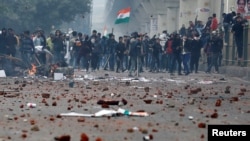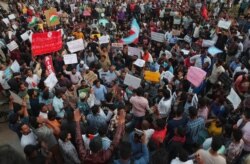Student Union
Indian Students Decry Police as Citizenship Protests Grow

Indian student protests that turned into violent clashes with police galvanized nationwide opposition on Tuesday to a new law that provides a path to citizenship for non-Muslim migrants who entered the country illegally from several neighboring countries.
Police fired tear gas in the Seelampur area of New Delhi to push back protesters who burned a police booth and two motorbikes after throwing stones and swarming barricades.
Roads leading to the Muslim-majority neighborhood were strewn with stones, tear gas canisters and shards of broken glass.
"We are protesting against the new citizenship law. They are saying if you don't have any proof (of citizenship) they will send us out of India," said 15-year-old Mohammad Shehzad.
Protests against the law were also reported in the states of West Bengal, Kerala, Karnataka and elsewhere. On Sunday, a march by students at New Delhi's Jamia Millia Islamia University descended into chaos when demonstrators set three buses on fire. Police responded with rubber bullets and tear gas. Videos showed officers running after unarmed protesters and beating them with wooden sticks.
Hanjala Mojibi, an English major at the predominantly Muslim school, said that when he and others saw police enter the campus, they walked toward them with their hands up to indicate their protest was nonviolent.
"The police made all 15 of us kneel and started beating us. They used lots of abusive words. One of them removed my prescription glasses, threw (them) on the ground, broke them and told me to look down," Mojibi said at a news conference in tears.
Simultaneously on Sunday, police stormed Aligarh Muslim University in the north Indian state of Uttar Pradesh firing tear gas and injuring five people who were participating in a student-led demonstration, university spokesman Rahat Abrar said.
Shahid Hussain, a 25-year-old history major, said police broke the windows of his dormitory and lobbed a tear gas canister inside. He said after fleeing the building to escape the fumes, police pushed him against a tree and beat him with sticks.
Police spokesman Sunil Bainsla denied the account, calling the allegations of police brutality "lies."
The police response to Sunday's protests has drawn widespread condemnation. It also has sparked a broader movement against the Citizenship Amendment Act, with demonstrations erupting across the country.
The new law applies to Hindus, Christians and other religious minorities who are in India illegally but can demonstrate religious persecution in Muslim-majority Bangladesh, Pakistan and Afghanistan. It does not apply to Muslims.
Prime Minister Narendra Modi's ruling Hindu nationalist Bharatiya Janata Party has described the law as a humanitarian gesture.
While it was being debated in Parliament last week, Home Minister Amit Shah said it was "not even .001% against minorities. It is against infiltrators." Modi told an election rally in eastern Jharkhand state on Tuesday that no Indian citizen would be affected by the law. Speaking about Sunday's protests, he accused the opposition Congress party of using students for political purposes.
"The decisions made by the government should be discussed and any voice should be raised in a democratic manner. This government understands your concerns but some people use your shoulder for firing a gun," he said. "I dare Congress, its friends, to publicly declare they are prepared to accord Indian citizenship to all Pakistanis."
Congress party chief Sonia Gandhi met President Ram Nath Kovind as the head of an opposition delegation and asked that the citizenship law be withdrawn.
Talking to reporters, Gandhi said she fears "the situation may spread further."
"I think you all have seen that the Modi government seems to have no compassion when it comes to shutting down people's voices and implementing legislation," she said. Critics of the government say the law is intended to help the ruling party transform a multicultural and secular India into a Hindu "rastra," or distinctly Hindu state and further marginalize India's 200 million Muslims.
India is 80% Hindu and 14% Muslim, which means it has one of the largest Muslim populations of any country in the world.
Police spokesman M.S. Randhawa said 10 people were arrested during Sunday's protest at Jamia Millia Islamia University from Jamia Nagar, a Muslim neighborhood near the university.
"We found out that the arrested men had instigated the crowds and were also responsible for vandalizing public property," Randhawa said.
Students said police lobbed tear gas shells inside the campus, broke down the doors of the library and yanked students out to assault them. Dozens of students were taken to hospitals for treatment.
Police have denied the allegations and said they acted with restraint.
The citizenship law follows a contentious citizenship registry process in northeastern India's Assam state intended to weed out people who immigrated to the country illegally.
Nearly 2 million people in Assam were excluded from the list, about half Hindu and half Muslim, and have been asked to prove their citizenship or else be considered foreign. India is constructing a detention center for some of the tens of thousands of people the courts are expected to ultimately determine came to the country illegally.
Home Minister Shah has pledged to roll it out the program nationwide, promising to rid India of "infiltrators."
The Citizenship Amendment Act could provide protection and a fast track to naturalization for many of the Hindus left off Assam's citizenship list, while explicitly leaving out Muslims.
The backlash to the law came as an unprecedented crackdown continued in Kashmir, India's only Muslim-majority area, which was stripped of special constitutional protections and its statehood in August. Since then, movement and communications have been restricted.
"Our country is not just for Hindus," said Chanda Yadav, 20, a Hindi literature student who was participating in a sit-in Monday at Jamia Millia Islamia University. "I feel it is my moral right to protest against something which divides us as a community."
See all News Updates of the Day
- By VOA News
Competition grows for international students eyeing Yale

It’s tough to gain admission to Yale University, and it’s getting even tougher for international students as standout students from around the world set their sights on Yale.
The Yale Dale News, the campus newspaper, takes a look at the situation here.
- By VOA News
Student from Ethiopia says Whitman College culture made it easy to settle in

Ruth Chane, a computer science major from Ethiopia, writes about her experiences settling into student life at Whitman College in the U.S. state of Washington.
"The community at Whitman College made sure I felt welcomed even before I stepped foot on campus," she says.
- By VOA News
Claremont Colleges student gets a shock when she heads home to Shanghai

In The Student Life, the student newspaper for the Claremont Colleges, a consortium of five liberal art colleges and two graduate schools in Claremont, California, student Rochelle Lu writes about readjusting to her Shanghai home after spending a semester in the United States.
- By VOA News
Cedarville University aims to ease transition for international students

Cedarville University in the U.S. state of Ohio says it’s got more than 140 international students representing 44 countries.
Here, the school interviews Jonathan Sutton, director of international student services. He talks about his job and the opportunities for international students on campus.
- By VOA News
Morehouse College offers prospective students tips on applying and thriving

Morehouse College, a private, historically Black liberal arts college in the U.S. state of Georgia, offers a guide for international students interested in attending the school.
Among the tips to apply and thrive at Morehouse:
- Take advantage of the school’s orientation program
- Turn to the school’s Center for Academic Success for tutoring, support and more
- Immerse yourself in campus life via clubs and societies
- By Reuters
US reviews Columbia University contracts, grants over antisemitism allegations

The administration of President Donald Trump said on Monday it will review Columbia University's federal contracts and grants over allegations of antisemitism, which it says the educational institution has shown inaction in tackling.
Rights advocates note rising antisemitism, Islamophobia and anti-Arab bias since U.S. ally Israel's devastating military assault on Gaza began after Palestinian Hamas militants' deadly October 2023 attack.
The Justice Department said a month ago it formed a task force to fight antisemitism. The U.S. Departments of Health and Education and the General Services Administration jointly made the review announcement on Monday.
"The Federal Government's Task Force to Combat Anti-Semitism is considering Stop Work Orders for $51.4 million in contracts between Columbia University and the Federal Government," the joint statement said.
The agencies said no contracting actions had been taken yet.
"The task force will also conduct a comprehensive review of the more than $5 billion in federal grant commitments to Columbia University."
The agencies did not respond to requests for comment on whether there were similar reviews over allegations of Islamophobia and anti-Arab bias.
Columbia had no immediate comment. It previously said it made efforts to tackle antisemitism.
College protests
Trump has signed an executive order to combat antisemitism and pledged to deport non-citizen college students and others who took part in pro-Palestinian protests.
Columbia was at the center of college protests in which demonstrators demanded an end to U.S. support for Israel due to the humanitarian crisis caused by Israel's assault on Gaza. There were allegations of antisemitism and Islamophobia in protests and counter-protests.
During last summer's demonstrations around the country, classes were canceled, some university administrators resigned and student protesters were suspended and arrested.
While the intensity of protests has decreased in recent months, there were some demonstrations last week in New York after the expulsion of two students at Columbia University-affiliated Barnard College and after New York Governor Kathy Hochul ordered the removal of a Palestinian studies job listing at Hunter College.
A third student at Barnard College has since been expelled, this one related to the occupation of the Hamilton Hall building at Columbia last year.
Canada’s immigration overhaul signals global shift in student migration
From Europe to North America, nations are tightening their immigration policies. Now Canada, long seen as one of the world's most welcoming nations, has introduced sweeping changes affecting international students. The reforms highlight a growing global trend toward more restrictive immigration policies. Arzouma Kompaore reports from Calgary.
Trump administration opens antisemitism inquiries at 5 colleges, including Columbia and Berkeley

The Trump administration is opening new investigations into allegations of antisemitism at five U.S. universities including Columbia and the University of California, Berkeley, the Education Department announced Monday.
It's part of President Donald Trump's promise to take a tougher stance against campus antisemitism and deal out harsher penalties than the Biden administration, which settled a flurry of cases with universities in its final weeks. It comes the same day the Justice Department announced a new task force to root out antisemitism on college campuses.
In an order signed last week, Trump called for aggressive action to fight anti-Jewish bias on campuses, including the deportation of foreign students who have participated in pro-Palestinian protests.
Along with Columbia and Berkeley, the department is now investigating the University of Minnesota, Northwestern University and Portland State University. The cases were opened using the department's power to launch its own civil rights reviews, unlike the majority of investigations, which stem from complaints.
Messages seeking comment were left with all five universities.
A statement from the Education Department criticized colleges for tolerating antisemitism after Hamas' Oct. 7, 2023, attack on Israel and a wave of pro-Palestinian protests that followed. It also criticized the Biden administration for negotiating "toothless" resolutions that failed to hold schools accountable.
"Today, the Department is putting universities, colleges, and K-12 schools on notice: this administration will not tolerate continued institutional indifference to the wellbeing of Jewish students on American campuses," said Craig Trainor, the agency's acting assistant secretary for civil rights.
The department didn't provide details about the inquiries or how it decided which schools are being targeted. Presidents of Columbia and Northwestern were among those called to testify on Capitol Hill last year as Republicans sought accountability for allegations of antisemitism. The hearings contributed to the resignation of multiple university presidents, including Columbia's Minouche Shafik.
An October report from House Republicans accused Columbia of failing to punish pro-Palestinian students who took over a campus building, and it called Northwestern's negotiations with student protesters a "stunning capitulation."
House Republicans applauded the new investigations. Representative Tim Walberg, chair of the Education and Workforce Committee, said he was "glad that we finally have an administration who is taking action to protect Jewish students."
Trump's order also calls for a full review of antisemitism complaints filed with the Education Department since Oct. 7, 2023, including pending and resolved cases from the Biden administration. It encourages the Justice Department to take action to enforce civil rights laws.
Last week's order drew backlash from civil rights groups who said it violated First Amendment rights that protect political speech.
The new task force announced Monday includes the Justice and Education departments along with Health and Human Services.
"The Department takes seriously our responsibility to eradicate this hatred wherever it is found," said Leo Terrell, assistant attorney general for civil rights. "The Task Force to Combat Anti-Semitism is the first step in giving life to President Trump's renewed commitment to ending anti-Semitism in our schools."
- By VOA News
STEM, business top subjects for international students

The Times of India breaks down the most popular subjects for international students to study in the U.S.
STEM and business lead the pack. Read the full story here. (January 2025)
- By VOA News
Safety and visa difficulties among misconceptions about US colleges

U.S. News & World report addresses some of the misconceptions about U.S. colleges and universities, including the difficulty of getting a visa.
Read the full story here. (January 2025)
- By VOA News
Work opportunities help draw international students to US schools

US News & World Report details the three top factors in foreign students' decision to study in the U.S. They include research opportunities and the reputation of U.S. degrees. Read the full story here. (December 2024)
- By VOA News
British student talks about her culture shock in Ohio

A British student who did a year abroad at Bowling Green State University in Ohio talks about adjusting to life in America in a TikTok video, Newsweek magazine reports.
Among the biggest surprises? Portion sizes, jaywalking laws and dorm room beds.
Read the full story here. (December 2024)
- By VOA News
Harvard's Chan School tells international students what to expect

Harvard's T.H. Chan School of Public Health reaches out to international students by detailing the international student experience at the school.
Learn more about housing, life in Boston and more here.
- By Reuters
China unveils plan to build 'strong education nation' by 2035

China issued its first national action plan to build a "strong education nation" by 2035, which it said would help coordinate its education development, improve efficiencies in innovation and build a "strong country."
The plan, issued Sunday by the Communist Party's central committee and the State Council, aims to establish a "high quality education system" with accessibility and quality "among the best in the world."
The announcement was made after data on Friday showed China's population fell for a third consecutive year in 2024, with the number of deaths outpacing a slight increase in births, and experts cautioning that the downturn will worsen in the coming years.
High childcare and education costs have been a key factor for many young Chinese opting out of having children, at a time when many face uncertainty over their job prospects amid sluggish economic growth.
"By 2035, an education power will be built," the official Xinhua news agency said, adding that China would explore gradually expanding the scope of free education, increase "high-quality" undergraduate enrolment, expand postgraduate education, and raise the proportion of doctoral students.
The plan aims to promote "healthy growth and all-round development of students," making sure primary and secondary school students have at least two hours of physical activity daily, to effectively control the myopia, or nearsightedness, and obesity rates.
"Popularizing" mental health education and establishing a national student mental health monitoring and early warning system would also be implemented, it said.
It also aims to narrow the gap between urban and rural areas to improve the operating conditions of small-scale rural schools and improve the care system for children with disabilities and those belonging to agricultural migrant populations.
The plan also aims to steadily increase the supply of kindergarten places and the accessibility of preschool education.
- By VOA News
A look at financial aid options for international graduate students in US

The Open Notebook, a site focusing on educating journalists who cover science, has complied a list of U.S. graduate program financial aid information for international students.







